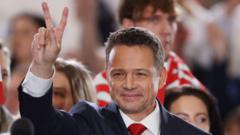Karol Nawrocki faces backlash for his bizarre TV appearance as an alter-ego to praise his own work.
Disguised Candidate's Literary Embarrassment Rocks Polish Election Race

Disguised Candidate's Literary Embarrassment Rocks Polish Election Race
Polish presidential hopeful ridiculed for using a pseudonym to promote his own book.
In a surprising turn of events, Karol Nawrocki, a candidate for the Polish presidency, found himself at the center of ridicule after it was disclosed that he masqueraded as a fictional character to promote his own book. The historian and museum director, who is backed by the right-wing Law and Justice party (PiS), donned a disguise to extol the qualities of his own work, which was published under the name Tadeusz Batyr. The book delves into the murky world of organized crime during Poland's communist era.
Nawrocki's appearance on television occurred back in 2018, where he perpetuated the impression that Batyr was a genuine author, with the blurred figure praising the historian's work. "This historian [Karol Nawrocki] actually really inspired me," the disguised individual claimed. To heighten the absurdity, Nawrocki had previously posted on social media about his meetings with Batyr, stating that he provided guidance on the book. This revelation has sparked a wave of mockery across Polish social media platforms, with several users questioning who will take the stage as the real candidate: Nawrocki or the fictional Batyr.
Despite the mounting criticism, Nawrocki downplayed the situation, asserting that literary pseudonyms are commonplace in Polish academia. He further insisted that he is the sole historian courageous enough to investigate organized crime in communist Poland, even though Batyr's works lack academic rigor. His fascination with the underworld has attracted media attention, as reports indicate his connections with figures linked to organized crime and motorcycle gangs.
Currently positioned in second place behind Warsaw mayor Rafal Trzaskowski of the liberal Civic Coalition party, Nawrocki faces challenges from the far-right candidate Slawomir Mentzen, who has recently gained traction with his ultra-low tax platform and immigration stance. The significance of this election extends beyond domestic politics, as Poland plays an instrumental role in supporting Ukraine amidst rising tensions. With a militarization agenda of nearly 5% of GDP this year, the implications of the election outcomes are profound.
In recent statements, Nawrocki has attributed Ukraine's war to the European elites' decisions, while those in the PiS party have accused the EU of attempting to interfere in the electoral process. The current political landscape positions Tusk ally Trzaskowski as the only pro-European option advocating for Ukrainian support, while projecting potential domestic reforms. Political analyst Marcin Zaborowski emphasizes the importance of this election for Polish voters, particularly amidst rising discontent among first-time voters and women regarding unfulfilled promises made by Tusk's coalition following its 2023 electoral victory.
As the race narrows with less than two months until polling, Karol Nawrocki remains intent on convincing the electorate that he alone is worthy of the presidency, striving to distinguish himself from the shadow of his doppelgänger, Tadeusz Batyr.
Nawrocki's appearance on television occurred back in 2018, where he perpetuated the impression that Batyr was a genuine author, with the blurred figure praising the historian's work. "This historian [Karol Nawrocki] actually really inspired me," the disguised individual claimed. To heighten the absurdity, Nawrocki had previously posted on social media about his meetings with Batyr, stating that he provided guidance on the book. This revelation has sparked a wave of mockery across Polish social media platforms, with several users questioning who will take the stage as the real candidate: Nawrocki or the fictional Batyr.
Despite the mounting criticism, Nawrocki downplayed the situation, asserting that literary pseudonyms are commonplace in Polish academia. He further insisted that he is the sole historian courageous enough to investigate organized crime in communist Poland, even though Batyr's works lack academic rigor. His fascination with the underworld has attracted media attention, as reports indicate his connections with figures linked to organized crime and motorcycle gangs.
Currently positioned in second place behind Warsaw mayor Rafal Trzaskowski of the liberal Civic Coalition party, Nawrocki faces challenges from the far-right candidate Slawomir Mentzen, who has recently gained traction with his ultra-low tax platform and immigration stance. The significance of this election extends beyond domestic politics, as Poland plays an instrumental role in supporting Ukraine amidst rising tensions. With a militarization agenda of nearly 5% of GDP this year, the implications of the election outcomes are profound.
In recent statements, Nawrocki has attributed Ukraine's war to the European elites' decisions, while those in the PiS party have accused the EU of attempting to interfere in the electoral process. The current political landscape positions Tusk ally Trzaskowski as the only pro-European option advocating for Ukrainian support, while projecting potential domestic reforms. Political analyst Marcin Zaborowski emphasizes the importance of this election for Polish voters, particularly amidst rising discontent among first-time voters and women regarding unfulfilled promises made by Tusk's coalition following its 2023 electoral victory.
As the race narrows with less than two months until polling, Karol Nawrocki remains intent on convincing the electorate that he alone is worthy of the presidency, striving to distinguish himself from the shadow of his doppelgänger, Tadeusz Batyr.




















